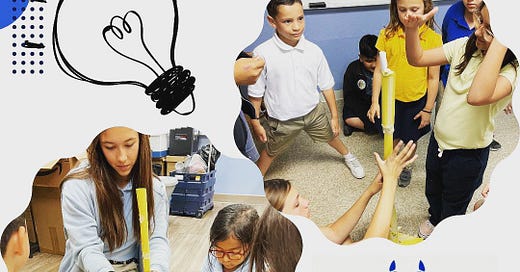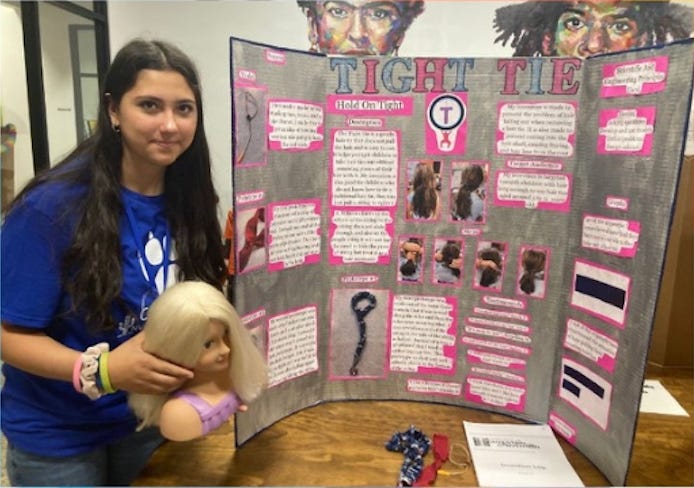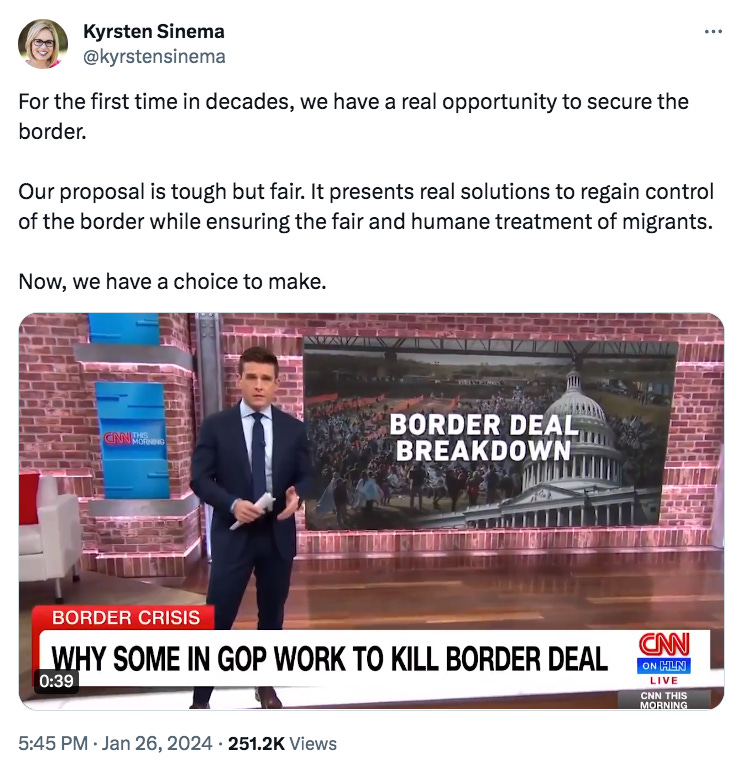The Daily Agenda: Tucson’s invention convention is growing statewide
Last year, a small charter school hosted the region’s first invention convention … The program is expanding in 2025 to serve all Arizona students and educators ... UA outlines its financial plan.
Big ideas often start as small ones, and that’s exactly the case of the Southern Arizona Invention Convention, which in just three years will have grown from a school-based event to a university-led statewide program.
The program got its start in Arizona through Carden of Tucson, a small charter school on the northwest side of town that a few years ago became the first in the state to teach invention education in every grade. Invention education challenges students to identify problems and create solutions using design-based invention and entrepreneurial thinking.
Last spring, Carden held its first Invention Convention with 60 students from kindergarten through eighth grade showcasing inventions that ran the gamut. The only common thread was that each project was personal to its student inventor.
Best in show winner Macy Sibley designed a product called Needle Point, a clothing design for diabetics that has patches or zippers in locations that would allow people to give themselves insulin injections without having to go through their clothing. The seventh grader’s idea came from her own struggles as a diabetic.
The convention is making a return in March and has expanded to include students from two additional districts. It’s also moving to a bigger stage, with students set to showcase their work at the University of Arizona’s Environment and Natural Resources 2 building.
Last year’s convention attracted judges from across the country and included industry experts, and organizers are hoping to once again attract top-tier thinkers for the competition’s second year. Next year, the program will be expanding statewide to serve all students and educators and will be led through Arizona State University.
But before Tempe takes all the credit, let’s revisit the invention convention’s history in the state, which can be attributed to Carden assistant director and middle school teacher Bri Livingood, who learned about it while teaching in Massachusetts. Invention education was started at MIT in the mid-1990s and has been prolific along the East Coast for the past 30 years.
When Livingood came to Carden and pitched the idea of teaching invention education in every grade, school administrators were quick to buy in. In the few years since, the school has partnered with MIT, Raytheon, the Henry Ford Museum, the Lemelson Foundation and others to help teach and support students.
This year, Carden has partnered with the UA program ENGAGED (ENGineering Access, Greater Equity and Diversity) to sponsor the event. Through the program, students with the college of engineering have been regularly visiting Carden to work with students on their prototypes.
For many Carden students, this will be their second year participating in the convention. They’ll be joined by student inventors from Vail and Chandler school districts, and Livingood is hoping that some homeschooled students will also sign on to participate.
To prepare for the convention, students spend the school year thinking about how to make existing items better and how to create things that will solve problems, which has been easier the second time around, Livingood said.
“A lot more kids are already talking about how they’ve been identifying problems,” she said. “The kids really see themselves as problem solvers, which is so fun as an educator.”
Even though it’s relatively new to the region, invention education has a long list of supporters in Tucson, including the Tucson Realtors Charitable Association and a handful of private funders.
This includes last year’s title sponsor and returning supporter, Billy Mordka of Harvey Mordka Realty.
“In this day and age with education being what it is, it’s never, ‘Hey, good news. We have a new program.’ It’s always, ‘Bad news. We’re cutting something,’” he said. “This fills a gap that’s much needed for kids to get involved and see where their creativity runs.”
Mordka also served as judge last year, saying it was great to see how the kids thought about their daily problems and hurdles.
“It’s a breath of fresh air to get out of the adult world and see problems from children’s eyes, whether that be keeping rattlesnakes off the porch or helping a disabled family member,” Mordka said.
Both Livingood and Mordka are excited to bring the competition to the UA campus, saying that for many students, this will be a totally new experience.
“A lot of students maybe only get down there for sporting events, but this just allows them to see themselves as having a legitimate place on the campus, too,” Livingood said.
But whether or not they go on to college, Mordka said, the problem-solving skills taught through invention education challenge students to think about what they can accomplish in their daily lives.
“It’s an awesome thing to be able to be surrounded by what you hope children are shooting for,” Mordka said. “A community is only as good as the activities and environments that are suitable for kids to grow up in. The more events like this, the more benefits for our community.”
Finally, a plan: The UA Interim Chief Financial Officer John Arnold outlined the school’s plan to handle its $177 million deficit during a special meeting yesterday, the Arizona Daily Star’s Ellie Wolfe reports. The school is facing layoffs and across-the-board cuts of 5% to 15%, according to the report presented to faculty during the meeting. With 75% of the university’s 101 units overspending in fiscal year 2024, each unit has been asked to present plans on how they would operate if 5%, 10% and 15% of their budgets were cut. From there, the UA will decide how much is cut.
Food forests: Tucson resident Brandon Merchant plans to take the “living pantry” of trees and plants in the Dunbar Springs neighborhood and spread it across Tucson to create a “food forest,” Grist’s Max Graham reports. Merchant works at the Community Food Bank of Southern Arizona and heads up a program that plants trees to provide shade and food. Caitlin wrote about the SOMBRA program a few years ago and its plan to plant 20,000 trees in Tucson by 2030. But it’s not just a Tucson idea. Food forests have already spread to Boston, Philadelphia, Miami, and other cities.
Too much trouble: The City of South Tucson sued two rental companies for allowing too much crime on their properties, Arizona Public Media’s Paola Rodriguez reports. The city sued AM Family Properties, LLC and Torino Avenue LLC, which own properties on South Sixth Avenue and East Benson Highway. The city wants a judge to order the companies to increase lighting at the properties, hire security guards, and put crime-free restrictions on new leases.
Dems focus on local race: A Tucson-area congressional district is a top target of national Democrats, the Tucson Sentinel’s Dylan Smith reports. The Democratic Congressional Campaign Committee highlighted the race in Congressional District 6, where Republican Rep. Juan Ciscomani narrowly beat Democrat Kirsten Engel in 2022. Engel is running again and she is one of 17 candidates nationwide the DCCC said they think can flip a district from Republican to Democrat.
Big-time stakes: The race for the seat held by Sen. Kyrsten Sinema, a Democrat-turned-independent, will have far-reaching consequences for the country and for Arizona, the Arizona Luminaria’s Yana Kunichoff reports. Sinema hasn’t said whether she’ll run for re-election, but the word is she’ll run as an independent. That would pit her against Democrat Ruben Gallego and Republicans Kari Lake and Mark Lamb. Whoever wins likely will join a divided Senate and their vote could decide the fate of legislation, including laws about abortion, defense, immigration, and presidential appointments.
Here we go again: GOP lawmakers in Arizona are trying to revive SB 1070, the 2010 immigration law that was mostly struck down by the U.S. Supreme Court for encroaching on federal immigration authorities, the Arizona Mirror’s Gloria Rebecca Gomez reports. State Sen. Warren Petersen echoed former President Donald Trump’s wildly inaccurate accusations about immigrants as he pitched SB 1231, aka the “Arizona Invasion Act.” The bill mirrors a Texas law that allows local law enforcement officers to arrest people they suspect crossed the U.S. - Mexico border illegally. A conviction could lead to six months in jail.
The next meeting of the solutions-focused community book club that Caitlin hosts with the Tucson Tome Gnome and Community Foundation for Southern Arizona is scheduled for Thursday, March 14, and you don’t want to miss this one.
We’ll be discussing John Vaillant’s “Fire Weather: A True Story from a Hotter Planet,” which takes readers on a journey through the intertwined histories of North America’s oil industry and the birth of climate science, to the unprecedented devastation wrought by modern forest fires, and into lives forever changed by these disasters.
The meeting kicks off at 5:30 p.m. with a pre-discussion panel of local experts (we’ll tell you more about that later) and the book discussion to follow. Refreshments will be served and the event is free to attend, but you need to RSVP in advance.
As an added bonus, Vaillant will be appearing on three panels and signing books at the Tucson Festival of Books on March 9 and 10 (read more about those here.)
We’ll be raffling off a handful of copies of Fire Weather in upcoming weeks. Stay tuned for details!
We’d love to expand our reach and host more community events, but we’re still trying to earn enough money for living wages. Help us become sustainable so we can be a true partner in the community.










Somebody should do a little digging on the LLCs behind those south side apartment complaints. A Quick Look at the Secretary of State’s entity search discloses that they have the same principal, and a Google of that person’s name reveals past history of substandard property management.